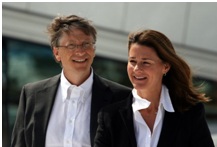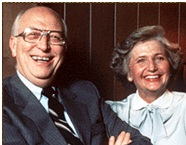|
 |
|
 |
|
|
||
Bill Gates Leadership
Bill Gates (1955- )
Founded Microsoft with his friend, Paul Allen, in 1975. Their big break came in 1980, when the IBM PC (then the biggest selling personal computer by far) used Microsoft’s operating system (MS-DOS). Microsoft’s huge success with Windows (introduced in 1990) has made him one of the world’s richest men, but he and his wife, Melinda, are giving his billions away to help the world’s poor. Gates (pictured right) resigned as Microsoft's chairman in 2014 to concentrate on his charity work
Why is he a great leader?
1. Vision and clear objectives He is constantly trying to create a better future for Microsoft and the world. “Put a computer on every desk and in every home running Microsoft software” was his first aim. Then with the Internet he wanted to provide people with “information at their fingertips”.
He’s a tough negotiator (he bought MS-DOS for only $50,000), who uses Microsoft’s money and power to try to kill its competitors (as he did with Netscape’s Navigator, the Internet browser, but, so far, failed to do with Google). Microsoft has been found guilty of illegal, anti-competitive policies in America and the EU.
He’s brilliant at mathematics, science and computer programming, writing his first software program at 13! He dropped out of his degree course at Harvard University to set up Microsoft with Paul Allen (pictured right together) . But he is a passionate believer in problem solving skills and lifelong education (see point 7) , which are essential to cope with a changing world, he says.
4. Passion for PC’s He started building computers when he was 12 and has always been excited about how much PC’s can improve communication and creativity. The Internet, he says, will achieve “friction free capitalism” by making customers better informed, and buying and selling easier.
He set up the Bill and Melinda Gates Foundation (both pictured right) in 2000 to use 90% of his wealth to help scientific research, education, the world’s poor and the fight against diseases like AIDS and malaria. He also wants businesses to do the same in what he calls “creative capitalism”.
He is very creative, because he’s always curious, experimenting and challenging existing knowledge. He has encouraged everyone at Microsoft to be as inventive as possible. He believes that Microsoft's greatest asset is the imagination of its workforce, which must be used to satisfy customers better than competitors. So listening and responding to customers’ needs and problems is vital, he believes.
He’s always learning and trying to improve himself and satisfy Microsoft’s customers better. “Your most unhappy customers are the greatest source of learning”, he says. But “success
So, despite his wealth, he’s never complacent, and always paranoid about failure. Every year, he has a “think week”, when he reads and thinks about around 100 research articles by Microsoft employees about the future of technology and Microsoft’s strategy. He loves hiring clever people and learning from them and outside experts.
He thinks that accelerating change and innovation are inevitable for people and businesses. So he wanted Microsoft to be in “constant renewal”, continuously:
He’s always optimistic and solves problems without giving in to them. But he accepts he can’t be good at everything, so he concentrates on what he does best.
Apart from his huge house (with 24 bathrooms and six kitchens!) overlooking Lake Washington, near Seattle and art collection, he is not extravagant. He enjoys working and giving away money, much more than spending it. He drives a modest Toyota Lexus, and his hobbies aren’t expensive (reading, golf and bridge which he plays with his close friend, Warren Buffett, pictured right together).
He hates wasting a single minute, so he gets other people to reduce his e-mails (4 million a day in 2004!) to 100 important ones for him to read. His days are usually filled with meetings, and he makes them as short and productive as possible. He works incredibly hard, often at weekends, and in the evenings after his three children have gone to sleep. “I work hard because I love my work”, he says. In 2005 he said he had gone to work every day since 1975.
12. Family He has been supported by his wife, Melinda, and wealthy parents (pictured right) in Seattle, who sent him to the best private school there and encouraged giving and learning. “I was fortunate to be raised in a family that encourage kids to ask questions”, he says. In the late 1960’s he was able to use his own computer, a rare opportunity then. His charity work was inspired by his mother, who told Melinda just before she died of cancer: “From those to whom much is given, much is expected”.
Key quotes on the learning organization Success is a lousy teacher. It's fine to celebrate success but it is more important to heed the lessons of failure. Your most unhappy customers are your greatest source of learning.
Key quote on money There is a certain responsibility that accrued to me when I got to this unexpected position
Key quotes on innovation If you’re too focused on your current business, it’s hard to change and concentrate on innovating.
Key quote on business success Every day we’re saying ‘How can we keep the customers happy? How can we get ahead in innovation by doing this?’ Because, if we don’t, somebody else will.
Key quote on education Education is society’s great leveller.
Key quote on human resource management Great organizations demand a high level of commitment by the people involved.
Key quote on careers If I had to choose between my job and having great wealth, I'd choose the job.
Key quote on computing The future of computing is the computer that talks, listens, sees and learns. |
|
|
||
|
|
||
| Copyright © wisdomtowin.com 2025 All Rights Reserved | ||
|





 is a lousy teacher”, he adds, because success
is a lousy teacher”, he adds, because success

